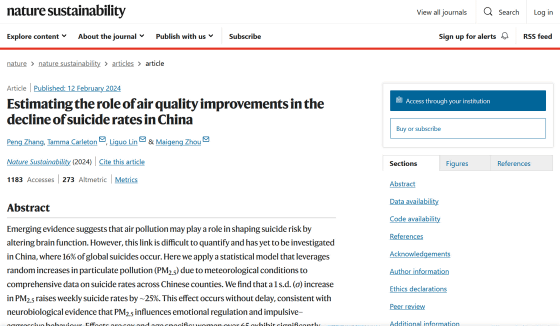It turns out that suicide rates skyrocket when air quality worsens

Air pollution is known to have a variety of negative effects on respiratory organs and brain function, and
Estimating the role of air quality improvements in the decline of suicide rates in China | Nature Sustainability
https://www.nature.com/articles/s41893-024-01281-2

Clearing the air reduces suicide rates | The Current
https://news.ucsb.edu/2024/021373/clearing-air-reduces-suicide-rates
Chinese Study Finds Suicide Rates Spike When Air Quality Drops : ScienceAlert
https://www.sciencealert.com/chinese-study-finds-suicide-rates-spike-when-air-quality-drops
Air Pollution Drives Suicide Rates Even On A Weekly Basis | IFLScience
https://www.iflscience.com/air-pollution-drives-suicide-rates-even-on-a-weekly-basis-73167
In China, which has a large population, many people commit suicide, and it is said that approximately 16% of suicides worldwide occur in China, but in recent years, that percentage has been decreasing. There are many possible reasons for the decline in suicide rates, ranging from increased income to cultural changes, but a research team led by Associate Professor Peng Chan, an environmental economist at the Chinese University of Hong Kong , found that I thought that the change might be related to the level of air pollution.
China used to be one of the world's leading countries in air pollution, but in 2013 it announced an ``Action Plan for Air Pollution Prevention and Control,'' implementing measures to regulate vehicle emissions, reform public transportation, and switch from coal to natural gas. We have introduced measures such as promoting clean energy generation such as solar and wind power, and expanding clean energy generation such as solar and wind power. As a result, the air pollution situation appears to have improved compared to a while ago.
At the same time as this improvement in air pollution, the national suicide rate also decreased significantly. According to the Chinese Center for Disease Control and Prevention, the annual suicide rate decreased from 10.88 to 5.25 per 100,000 people between 2010 and 2021.

To study changes in air pollution and suicide rates, Zhang and colleagues collected weekly air quality data from 1,400 air quality monitoring stations across China. Furthermore, in order to eliminate as much as possible the influence of human activities on suicide rates, we focused on a meteorological phenomenon called the '
The inversion layer usually lasts only a few hours, but at the local government level it can increase the concentration of PM2.5 in the air by about 1% per week. PM2.5 inhaled through the nose reaches the brain and has various effects, leading to deterioration of mental health and difficulty regulating emotions in the long term.
The analysis found that during weeks when air pollution worsened due to the inversion layer, suicide rates rose by up to 25% compared to normal times. Women aged 65 and older were particularly affected, with the suicide rate reportedly increasing by 2.5 times when air pollution worsened compared to normal times.
The increase in suicide rates associated with the occurrence of an inversion layer declined rapidly when air pollution did not persist for more than 7 days and air quality was reduced. This fact suggests that air pollution may have direct neurological effects that temporarily increase suicide rates, rather than causing chronic health problems that increase suicide rates. . The research team claimed, 'These are 'additional' suicides, deaths that would never have occurred had air quality not deteriorated.'

Furthermore, the research team's analysis showed that 10% of the decline in suicide rates in China between 2013 and 2017 could be due to a decrease in air pollution. This means that approximately 46,000 suicides were prevented due to reduced air pollution.
'We tend to think of suicide and mental health as issues that need to be understood and solved on an individual level,' said study co-author Tamma Carleton , an assistant professor at the University of California, Santa Barbara. 'It points to the importance of public and environmental policies beyond individual-level interventions to alleviate health and suicide crises.'
Related Posts:
in Science, Posted by log1h_ik







